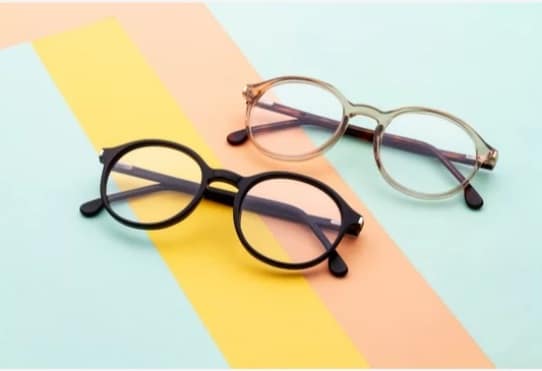In today's digital age, we spend more time than ever in front of screens, whether it's for work, entertainment, or staying connected with others. However, prolonged exposure to digital devices can lead to eye strain, fatigue, and potential long-term effects on our eye health. Enter blue light glasses, a popular solution to combat the harmful effects of blue light emitted by screens. In this blog post, we'll explore blue light glasses, their benefits, and how they can protect your eyes in the digital age.
Understanding Blue Light: Blue light is a short-wavelength, high-energy light emitted by digital devices such as smartphones, computers, tablets, and LED screens. While natural blue light exposure is beneficial during daylight hours, excessive and prolonged exposure to artificial blue light can cause eye discomfort and disrupt our sleep-wake cycle.
The Role of Blue Light Glasses: Blue light glasses, also known as computer glasses or blue light blocking glasses, are designed to filter out a portion of blue light emitted by digital screens. These glasses feature lenses that have a special coating or tint that selectively blocks or absorbs blue light, reducing its impact on our eyes.
Benefits of Blue Light Glasses:
- Reducing Eye Strain: Blue light glasses can alleviate eye strain caused by prolonged screen time. The lenses help to filter out blue light and minimize the glare, providing a more comfortable viewing experience.
- Relieving Digital Eye Fatigue: Spending long hours in front of screens can lead to digital eye fatigue, characterized by symptoms like dry eyes, blurred vision, and headaches. Blue light glasses can help alleviate these symptoms and provide relief.
- Improving Sleep Quality: Exposure to blue light in the evening can disrupt our sleep-wake cycle by suppressing the production of melatonin, a hormone that regulates sleep. Wearing blue light glasses in the evening can help reduce blue light exposure and promote better sleep quality.
- Protecting Long-Term Eye Health: Although research on the long-term effects of blue light is ongoing, there is evidence suggesting a potential link between excessive blue light exposure and conditions such as macular degeneration. Blue light glasses can act as a preventative measure to protect the eyes from potential harm.
Choosing the Right Blue Light Glasses: When selecting blue light glasses, consider the following factors:
- Blue Light Filtering Capabilities: Look for glasses that offer effective blue light filtering. Opt for lenses that block a significant percentage of blue light, ideally in the range of 30% to 50% or more.
- Lens Quality: Ensure that the glasses have high-quality lenses that provide clear and distortion-free vision.
- Fit and Comfort: Select frames that fit well and are comfortable to wear for extended periods. Consider lightweight and ergonomic designs that suit your personal style.
- Prescription Options: If you require prescription glasses, opt for blue light glasses with prescription lenses to address both your vision needs and blue light protection.
In the digital age, protecting our eyes from the harmful effects of blue light is essential. Blue light glasses offer a convenient and effective solution by reducing eye strain, relieving digital eye fatigue, promoting better sleep, and potentially safeguarding long-term eye health. When choosing blue light glasses, prioritize those with significant blue light filtering capabilities, high-quality lenses, and a comfortable fit. By incorporating blue light glasses into your daily routine, you can enjoy screen time while taking proactive steps to protect your eyes in the digital age.


